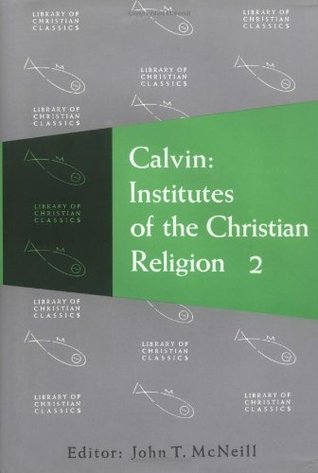Unbelief in the Institutes


There are several English translations of John Calvin’s Institutes of the Christian Religion. The most popular is the Ford Lewis Battles translation edited by John T. McNeill and published by The Westminster Press. When I first became serious about studying theology, my pastor at the time recommended I buy this edition — and so I did. My copy of this two-volume set was purchased way back in 1992.
Over the years, I’ve referred to it often. I’ve also encountered criticisms both of the translation and the notes. In The Unaccommodated Calvin, Richard Muller complains that all three modern translations (Allen, Battles, Beveridge) are deficient in the way they translate Calvin’s technical vocabulary (p.177). Somewhere, I’m not quite sure where anymore, Muller mentions that, overall, he still prefers the Allen translation (find it online here). Muller and others have also noted that the Battles/McNeill edition has theological issues — the translator and editor were not exactly confessionally Reformed.
I recently encountered a notable instance of liberal bias in Institutes 1.8.8. Calvin is writing about Scripture. He notes how the prophets predicted events long before they happened. He provides an example from Isaiah:
Let us grant that to predict, long before, what at the time seemed incredible but at last actually came to pass was not yet a clear enough token of divine inspiration. Yet from what source but God shall we say have come those prophecies which Isaiah at the same time utters concerning release? He names Cyrus [Isa. 45:1] through whom the Chaldeans had to be conquered and the people set free. More than a hundred years elapsed from the time the prophet so prophesied and the time Cyrus was born; for the latter was born about a hundred years after the prophet’s death. No one could have divined then that there was to be a man named Cyrus who would wage war with the Babylonians, would subdue such a powerful monarchy, and terminate the exile of the people of Israel. Does not this bare narrative, without any verbal embellishment, show the things Isaiah recounts to be undoubted oracles of God, not the conjectures of a man?
Beautifully put. However, the editor J. T. McNeill goes and tries to deflate Calvin’s whole argument with this footnote:
The modern view of the late date of Isa., ch.45, does not of course enter Calvin’s mind in this argument.
There are indeed modern scholars who hold to a late date for that part of Isaiah. They actually deny that Isaiah wrote it. They say that it was someone else using Isaiah’s name and writing about the events long after they occurred. This view would never enter Calvin’s mind not only because it would not surface for a few hundred years, but also because Calvin believed the testimony of Scripture.
So there’s unbelief in the Institutes, but it’s not coming from the pen of Calvin himself. The unbelief is from his unbelieving English editor. If you’re referring to the Battles edition of the Institutes, be careful with the footnotes!


